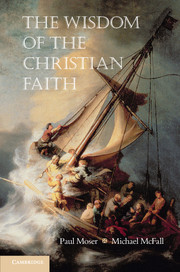Book contents
- Frontmatter
- Contents
- Contributors
- Introduction:Philosophy and Cruciform Wisdom
- Part One Wisdom, Faith, and Reason
- Part Two Wisdom, Love, and Evil
- 5 Wisdom and Evil
- 6 Moral Character and Temptation
- 7 Altruism, Egoism, and Sacrifice
- 8 Unconditional Love and Spiritual Virtues
- Part Three Wisdom, Contemplation, and Action
- Index
- References
8 - Unconditional Love and Spiritual Virtues
Published online by Cambridge University Press: 05 December 2012
- Frontmatter
- Contents
- Contributors
- Introduction:Philosophy and Cruciform Wisdom
- Part One Wisdom, Faith, and Reason
- Part Two Wisdom, Love, and Evil
- 5 Wisdom and Evil
- 6 Moral Character and Temptation
- 7 Altruism, Egoism, and Sacrifice
- 8 Unconditional Love and Spiritual Virtues
- Part Three Wisdom, Contemplation, and Action
- Index
- References
Summary
Some Thoughts About Wisdom
The apostle Paul tells us that Christian teaching will appear to be foolishness to those outside the spiritual community and that what counts as wisdom there is actually a doctrine of death (1 Cor. 1:18; Bible quotations are from the Revised Standard Version (RSV) unless otherwise noted). One of the teachings that are likely to appear foolish to those whose minds reflect “the wisdom of the world” (v. 21) is Jesus’ command to love our enemies. Christians regard that command itself as a piece of wisdom, and the understanding of the command as required for those who would be really wise.
In the following pages I shall ruminate philosophically about what it is to love our enemies, “processing” the wisdom of Jesus and the apostles in such a way as to try to get “inside” it, to understand it better. Here philosophy will be in the service of a wisdom that does not originate in philosophy, at least as the word philosophy is mostly understood in the history of philosophy. As a discipline, philosophy aims at understanding – in the current application, a better understanding of the command to love our enemies. Wisdom itself is a kind of understanding, and so the application of philosophy to a piece of Christian wisdom is natural and holds the potential to increase the wisdom of members of the Christian community.
- Type
- Chapter
- Information
- The Wisdom of the Christian Faith , pp. 156 - 172Publisher: Cambridge University PressPrint publication year: 2012
References
- 1
- Cited by



